It’s now been a bit more than 2 weeks since the second edition of the Open IoT Challenge has officially started. More than 80 teams have applied to be part of the challenge, and if you ask me, that’s really exciting!
They will be working until end of February next year to complete their project, and to demonstrate how open source and open standards can help build innovative IoT solutions faster.
We have awarded the 16 most promising proposals a starter kit that we hope will help them bootstrap their project. The kits a $150 gift card to buy IoT hardware, as well as access to special offers from our sponsors.

The lucky teams/participants are:
- Sarthak Sethi – Farm monitoring
- Davide De Cesaris & Marcello Majonchi – IoT into space
- Shivankur Pilania – Artificial Intelligence based circadian clock
- Deepak Sharma & team – Smart kitchen container
- András Vörös & team – Improving cyber-physical systems with IoT technologies
- Iranga Supun Athukorale & team – Elderly care using advanced thermal footprint tracking
- Tien Cao-hoang – Water level monitoring for paddy fields
- Franz Schnyder – “IoT-ing” a mountain’s hut off-grid solar power system
- Ettore Verrecchia – Remotely controlled intelligent street lamp
- Mahavir Dwivedi & team – Remote monitoring of patient’s vital parameters for rural areas
- Manolis Nikiforakis & team – Device management for the ESP8266 using LWM2M, Leshan, Wakaama and Kura
- Aprian Diaz Novandi & team – Forest fire detection
- Rajesh Sola & team – Adding MQTT-SN support to Eclipse Kura
- MirMohamed Salman & team – Finding petroleum/service station based on vehicle breakdown indication
- Tobiasz Dworak – Medical IoT gateway based on Eclipse Kura
- Steve Liang & team– Connected babies
All the participants will be sharing their experience on our dedicated Tumblr, so you probably want to follow it if you’re interesting in following their stories!


